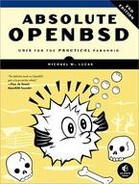- Advance Praise for Absolute OpenBSD, 2nd Edition
- Dedication
- About the Author
- About the Technical Reviewer
- Foreword
- Acknowledgments
- Introduction
- 1. Getting Additional Help
- 2. Installation Preparations
- 3. Installation Walk-Through
- 4. Post-Install Setup
- 5. The Boot Process
- 6. User Management
- 7. Root, and How to Avoid It
- The Root Password
- Using Groups
- Hiding Root with sudo
- Using sudo
- sudoedit
- The Biggest sudo Mistake: Exclusions
- sudo Logs
- 8. Disks and Filesystems
- Device Nodes
- DUIDs and /etc/fstab
- MBR Partitions and fdisk(8)
- Labeling Disks
- The Fast File System
- What’s Currently Mounted?
- Mounting and Unmounting Partitions
- How Full Is That Partition?
- Adding New Hard Disks
- 9. More Filesystems
- 10. Securing Your System
- 11. Overview of TCP/IP
- 12. Connecting to the Network
- 13. Software Management
- 14. Everything /etc
- /etc Across Unix Variants
- The /etc Files
- /etc/adduser.conf
- /etc/amd
- /etc/authpf
- /etc/bgpd.conf
- /etc/boot.conf
- /etc/changelist
- /etc/chio.conf
- /etc/csh.*
- /etc/daily and /etc/daily.local
- /etc/dhclient.conf
- /etc/dhcpd.conf
- /etc/disklabels/
- /etc/disktab
- /etc/dumpdates
- /etc/dvmrpd.conf
- /etc/exports
- /etc/fbtab
- /etc/firmware
- /etc/fonts/
- /etc/fstab
- /etc/ftpchroot
- /etc/ftpusers
- /etc/gettytab
- /etc/group
- /etc/hostapd.conf
- /etc/hostname.*
- /etc/hosts
- /etc/hosts.equiv
- /etc/hosts.lpd
- /etc/hotplug/
- /etc/ifstated.conf
- /etc/iked/, /etc/iked.conf, /etc/ipsec.conf, and /etc/isakmpd
- /etc/inetd.conf
- /etc/kbdtype
- /etc/kerberosV/
- /etc/ksh.kshrc
- /etc/ldap/ and /etc/ldapd.conf
- /etc/localtime
- /etc/locate.rc
- /etc/login.conf
- /etc/lynx.cfg
- /etc/magic
- /etc/mail/
- /etc/mail.rc
- /etc/mailer.conf
- /etc/man.conf
- /etc/master.passwd, /etc/passwd, /etc/spwd.db, and /etc/pwd.db
- /etc/mixerctl.conf
- /etc/mk.conf
- /etc/moduli
- /etc/monthly and /etc/monthly.local
- /etc/motd
- /etc/mrouted.conf
- /etc/mtree/
- /etc/mygate
- /etc/myname
- /etc/netstart
- /etc/networks
- /etc/newsyslog.conf
- /etc/nginx/
- /etc/nsd.conf
- /etc/ntpd.conf
- /etc/ospf6d.conf and /etc/ospfd.conf
- /etc/pf.conf and /etc/pf.os
- /etc/ppp/
- /etc/printcap
- /etc/protocols
- /etc/rbootd.conf
- /etc/rc.*
- /etc/relayd.conf
- /etc/remote
- /etc/resolv.conf and /etc/resolv.conf.tail
- /etc/ripd.conf
- /etc/rmt
- /etc/rpc
- /etc/sasyncd.conf
- /etc/sensorsd.conf
- /etc/services
- /etc/shells
- /etc/skel/
- /etc/sliphome/
- /etc/snmpd.conf
- /etc/ssh/
- /etc/ssl/
- /etc/sudoers
- /etc/sysctl.conf
- /etc/syslog.conf
- /etc/systrace/
- /etc/termcap
- /etc/ttys
- /etc/weekly and /etc/weekly.local
- /etc/wsconsctl.conf
- /etc/X11
- /etc/ypldap.conf
- 15. System Maintenance
- 16. Network Servers
- 17. Desktop OpenBSD
- 18. Kernel Configuration
- 19. Building Custom Kernels
- 20. Upgrading
- 21. Packet Filtering
- 22. Advanced PF
- 23. Customizing OpenBSD
- A. Afterword
- Index
- About the Author
- Copyright
Subpackages
Some ports contain multiple wildly different packages. This isn’t like adding LDAP support to Apache or Motif support to Vim—those are changes to the existing package, not wildly different. Some ports create two completely different packages, such as a database client and the associated database server. I’ve drawn in OpenLDAP through this chapter’s examples, and both the OpenLDAP server and client come from the same port: databases/openldap. Other applications might have plug-ins for accessing several different database engines. These are called subpackages or multipackages.
Unlike flavors, OpenBSD provides all subpackages of a port. You can install both the server and client versions of OpenLDAP from official packages. When the port is built, all the subpackages are built. The package is split into subpackages at the package-bundling stage.
To see all the subpackages supported by a port, run the following command:
# cd /usr/ports/databases/openldap # make show=MULTI_PACKAGES -main -server
This port has two subpackages: openldap-main and openldap-server.
How can you learn what each subpackage includes? As with flavors, you can check its description file, which is pkg/DESCR. OpenLDAP includes pkg/DESCR-server and pkg/DESCR-main. Reading these shows that the main package is the client, as you would expect.
If you run make install in the port directory, you get the main version of the port—in this case, the OpenLDAP client. OpenLDAP clients outnumber the servers, so that’s also what you would expect. To build a different subpackage, set SUBPACKAGE in the environment on the command line, as you did for flavors.
# env SUBPACKAGE="-server" make package
This builds the -server version. Be sure to include the leading dash, as specifying a nonexistent subpackage makes the build fail.
-
No Comment
